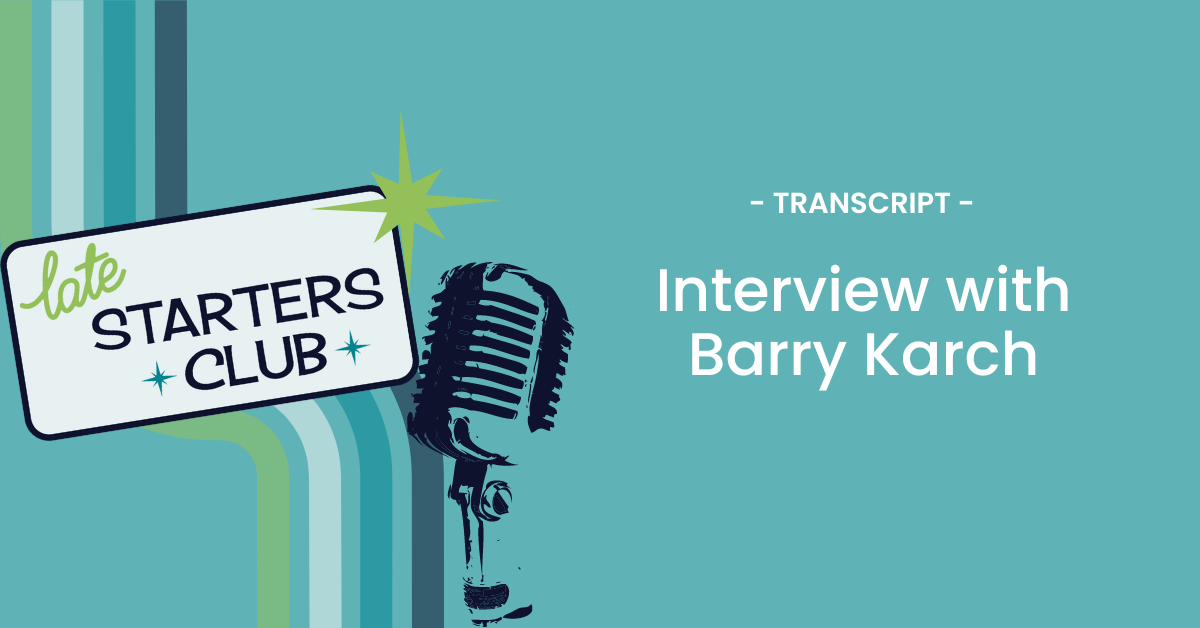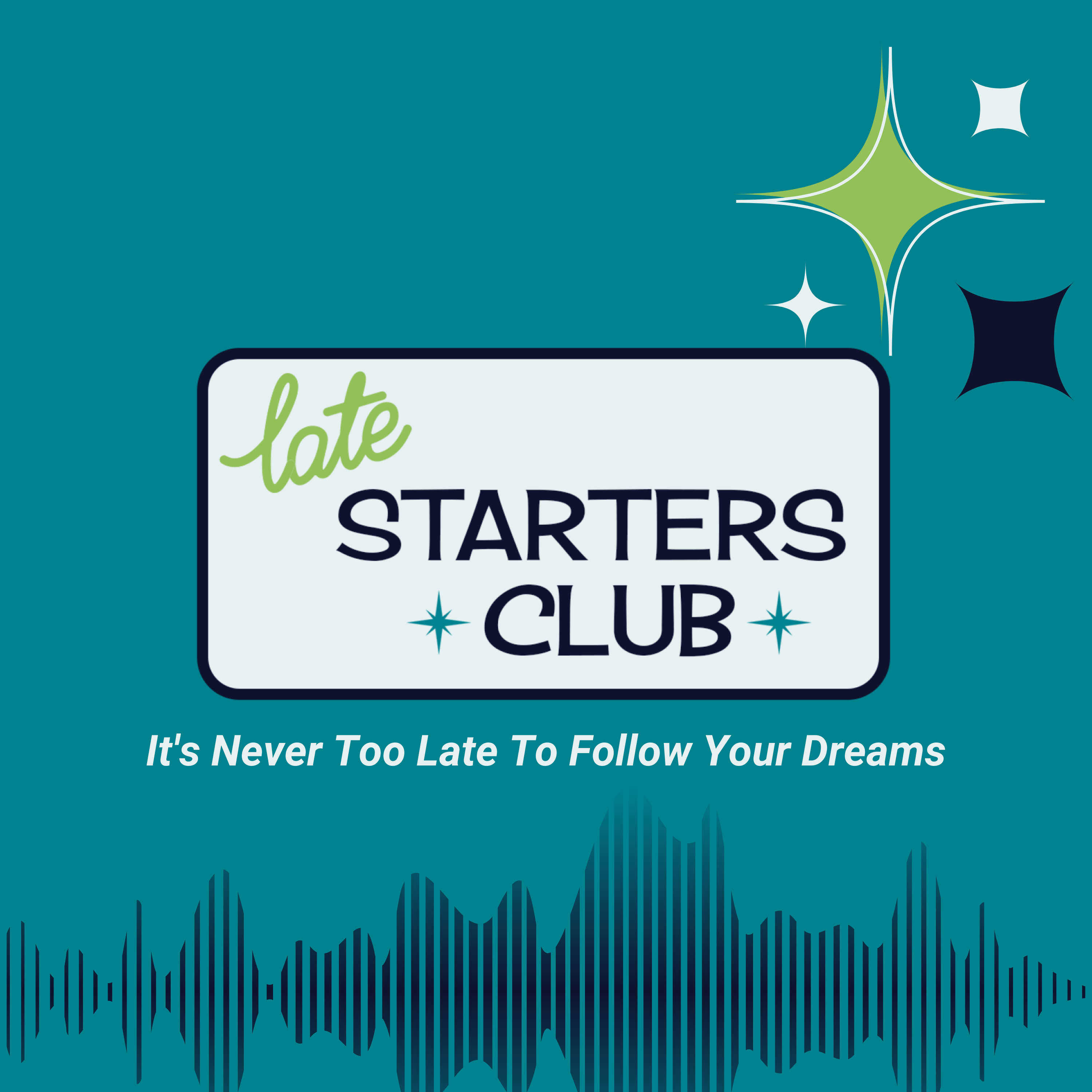Subscribe Apple | Google | Spotify | Stitcher | iHeart Living the Dream Overseas with Christine Gritmon Have you had a lifelong dream to live overseas and haven't made that happen yet? Maybe things have gotten in the way like family, jobs, life. My...
Ep28 Transcript – Interview with Thomas Petty

Andrea Vahl: Hi Late Starters, what would you do if a loved one was faced with a life-threatening health problem that the doctors couldn’t solve? if you were Tom Petty, no relation to the singer, you would research the situation and find a way to make a major health change. Not only taking care of his wife’s issue but also a lifelong health issue that he himself had. Tune into today’s episode where you learn more about it.
Intro: Hello dreamers. Welcome to the Late Starters Club, giving you the inspiration, mindset, and tools you need to start something midlife and beyond. Remember, it’s never too late to follow your dreams.
Andrea Vahl: Hi Late Starters. It’s Andrea Vahl, your host, and I am joined by a friend of mine, Thomas Petty. Tom Petty, not THE Tom Petty, the…
Thomas Petty: I’m the only one that I know.
Andrea Vahl: That’s right. And we are going to dive into Tom’s story of, how he used some alternative healing methods to heal both him and his wife of some different things, just recently in the last few years.
So welcome Tom.
Thomas Petty: Thank you. Thanks for having me. I’m looking forward to this.
Andrea Vahl: I know. It’s super, super great and on this podcast, we talk about, people who have started a new endeavor and that includes new healthy lifestyles, healthy habits, and things that are new to them, in midlife.
And I’ve known you as an entrepreneur, so, this is, fun to get to talk to you about this other side of your life, which is, dealing with all these health challenges that you and your wife have come across. So why don’t you tell us a little bit about what was happening? How you’ve changed, everything related to food and all of that kind of thing.
Thomas Petty: Yeah. my wife and I, we’ve been married for what, 23 years now. And, we’re just going along as a middle-aged couple. We’ve got two teenage girls. My wife’s, two daughters.
I’m the evil stepfather to them, and. Just rolling along through life. We both had our careers doing our thing. And, on my wife’s birthday in 2011, she got up, she had taken the day off from work because it was her birthday. She had gotten up and, was complaining that she was feeling dizzy.
Her speech was slurred and I said, are you sure you haven’t just had a little too much, birthday cheer? She’s, no, it’s 10 o’clock in the morning. I haven’t had any of that, so we didn’t think too much of it. And, she was on some, different medications, and I had looked online and one of the medications had a side effect of slurred speech or, dizziness.
And it’s okay, maybe that’s what’s going on. So the next day, it hadn’t gotten any better. So we talked to her doctor and her doctor was like, no, it’s not the medicine. Get her to the ER right now. And, so I took her to the ER and they diagnosed her as having had a stroke and, pretty young, in her forties.
And, gave her a bunch of drugs and sent her on her way. Said, take these pills. Two months later this happened again, only worse. And went back to the ER and yeah, they did an MRI they could see it in her brain, and they’re like, this may not be a stroke. Maybe this is multiple sclerosis, but we’re really not sure.
This happened several more times, over the course of several months. And then in July of 2012, the night before we had been to her ex-husband’s birthday party and had a nice time. And she woke up, the next morning and was completely paralyzed on the left side of her body. Couldn’t move her arm, couldn’t move her leg, and just like the left side was dead.
And, so I struggled to get her into the bathroom and, get her dressed and stuff and went off to the ER again. But, Meanwhile, she’s seen a bunch of specialists and at this point, they’re saying, we think she has brain cancer and we can see the lesion on her brain stem. And, the type of cancer that they were talking about meant that she probably had three or four months to live.
And, They were going to do brain surgery to actually see if they could take a piece out and look at it and see if that’s really what was going on. And at the last second they backed out and they said, you know what? The MRI shows that the lesion has shrunk and, cancer doesn’t shrink, so it’s not cancer, but we still don’t know what it is.
This is a very long story, but I’m trying to keep it short. But spin forward three and a half years. She continued to improve from being paralyzed on the left side. She regained some mobility, but not all of it. Three and a half years, she had a devastating event where she nearly died and, ultimately they did do brain surgery on her.
They took a piece out and finally said, oh, this is what you have. Now we know. And it’s a very rare autoimmune disease, that is attacking the blood vessels in your brain and it’s causing stroke-like symptoms. . I have my own autoimmune disease. I have psoriasis that attacks my skin and leaves ugly rashes and so forth, Through all of this, I’m doing research like a madman because all the king horses and all the king’s men can’t figure out what’s going on with my wife.
And I finally concluded that this had to be an external factor. There had to be something that happened that was causing this, this isn’t just some mystery disease. There’s a reason for it. And I concluded that it had to be something related to food that her body was reacting to food in some way, and it was causing her body to attack her brain.
The doctors just scoffed at us. And no, it’s not that. Absolutely not. We don’t know what it is, but it’s not food. It can’t be food. But we don’t know what causes it. We don’t know. Sometimes it goes away, sometimes it doesn’t go away. We don’t know why. But it’s not food. Long story, but basically we cleaned up our diet, the standard American diet, or SAD as I call it and kicked that to the curb. And over the last 10 years, she’s continued to heal. Her disease has gone away. She’s gone from being wheelchair-bound to using a walker to using a cane, to now being mobile. She’s still disabled because she has brain damage, but, she’s able to get around by herself and her disease has gone away.
Meanwhile, my disease went away. So my skin, my terrible psoriasis that I’ve had since day one, has healed and it’s now 99% in remission because of what we’ve changed.
Andrea Vahl: Wow. That is amazing. That is amazing. To go from such a debilitating situation, almost death to where she’s at now. With just food.
So walk us through some of the research that you did. I’ve heard so many things about autoimmune disorders and food-related things. How did you find what the proper diet would be for you and how did you research all this?
Thomas Petty: I started researching, and I don’t remember exactly how I got to this point, but I was just looking for any answer.
And, there were several books that I read. One was, by and all three of these books are by, physicians. And one of ’em is, Green Brain by Dr. David Perlmutter. And it talks about the damage that greens do to us. Because of lectins and other proteins in the grains, our bodies are really not designed to, consume and digest grains.
And yet it’s at the very bottom of the food pyramid this is what you should be eating most of is grains and, our bodies react to grains in ways that, can cause autoimmune diseases and other disorders.
Andrea Vahl: Yeah. I love bread. I love bread. Its so yummy!
Thomas Petty: yeah, I know. I do too. I do. Yeah. Give, gimme a slab of bread and some butter and I’m in hog heaven,
So that was one book that was a real eye opener. Another book, is, by Dr. Terry Walz and it’s called The Walls Protocol. And it’s basically his, thing is eat the rainbow. We don’t eat enough fruits and vegetables in our standard American diet, and really we need to eat a lot more fruits and vegetables and a lot less of the grains and what I call brown foods.
Grains and legumes and those kinds of foods. And then the third book that just blew my mind is by Dr. Steven Gundry and it’s called The Plant Paradox. And, he talks about how legumes especially, are very toxic for us because of lectins and other proteins. The beans and, peanuts are also a legume have these chemicals that are actually designed to, kill the insects that are eating them.
And those of us that have autoimmune diseases are actually very sensitive to those lectins and other chemicals and, Causes our autoimmune diseases to get much worse.
Andrea Vahl: Interesting. Yeah, so yeah, my peanut sandwich at lunch wasn’t good. I suppose
Thomas Petty: Yeah. Yeah, definitely. Grains and legumes are heavily touted as being health foods. They’re promoted by the government because they’re heavily subsidized by the government.
And, when in reality those two food groups are really, not doing most of us any good. And by eliminating primarily those two things, plus we eliminated sugar as well as dairy and, primarily ate meat, fish, vegetables, and fruits. And I tend not to eat a lot of fruit because it has a lot of sugar in it, which I prefer to avoid.
. So by just going down to, meat, fish, fruits and vegetables, our body’s completely transformed and completely changed. And actually our diseases reversed themselves and. I went in for a physical and my doctor was like, what the hell are you doing? You’ve got the blood work of a teenager,
It’s, it’s like, what are you doing? My cholesterol dropped 120. And, my blood pressure went down to 90 over 60 and, just all kinds of blood markers, just like wow. So it was an interesting journey.
Andrea Vahl: Yeah. Yeah. That’s great. So did you tapped into any online, groups or anything like that?
Or were you doing a lot of this on your own?
Thomas Petty: Nope, this was all on our own. And my wife was a reluctant, participant in this. She was like, no, I really likemy Diet Dr. Pepper. And, take away her chocolate. And she was like, Uhuh hard no, on that one. ,
Andrea Vahl: oh, wait a second. Wait a second. No chocolate. But is that, is it the sugar factor or is it just the, I guess it’s cocoa bean is.
Thomas Petty: Yeah, it’s two things. Most chocolate that we consume has a ton of sugar and milked chocolate, it’s just a sugar bomb. Yeah. Chocolate is, a forbidden food on the autoimmune protocol.
So you have to test it and see if it’s okay or not. It doesn’t seem to bother me. It doesn’t seem to bother my wife. So we do eat dark chocolate, very dark chocolate. It doesn’t have any added sugar in it.
Andrea Vahl: Okay. All right. I can, I, how does this affect your daily life? Is it challenging to go out to eat?
Is it challenging to, go to parties where they’ve got all kinds of little pastries? Bready things and things like that.
Thomas Petty: Exactly. Yeah. Going to other people’s houses is the biggest challenge, at a restaurant you can, okay, I’ll get a salad. It’s usually, not too hard to find something that you can eat.
. But yeah. Going over to somebody’s house, It’s Tom, why aren’t you eating? It’s sorry. I can’t eat any of the food that you have put out. Why didn’t you tell us? That’s a challenge. And so sometimes I pre-eat because I know that it’s going to be hard to eat.
Andrea Vahl: Yeah. . Yeah. Yeah. But at the same time, you’ve seen the consequences are, essentially near death. And it just makes it a complete no-brainer to just say we have to eat this way,
Thomas Petty: yeah. Yeah. And it’s, it’s cultural. It’s, we eat pasta, we eat hamburger and french fries, all of these things that it’s just, that’s just normal to eat. And so it was a lot of work to change those habits and it’s no, I can’t eat that because of whatever is in it. So now it’s just natural for us and every once in a while I’m going for something and my wife’s, she’s now much better at it and are you sure you want to eat that, Tom?
Yes, I know . So she keeps me honest rather than me trying to drag her along.
Andrea Vahl: Yeah. I know that you have become sort of an advocate for this as well, especially who have psoriasis, right? have you seen results from people who have adopted this diet?
Thomas Petty: Absolutely. Yeah, absolutely. I was just talking to one of my clients the other day that, he’s jumped into the deep end with the program. and, three or four months in, he’s yeah, my severe psoriasis is about 80% better, than it was three months ago. So he’s seeing dramatic changes in his body.
So yeah, it’s almost a miracle because, You know when the story is that when I was born, they handed my mother, her brand new baby and said, gee, we’re sorry Mrs. Petty, but your son’s never going to have nice skin. And it was just from day one that I was an ugly baby. had ugly skin. Yeah.
Andrea Vahl: Oh wow. Wow.
And that must have been challenging. Growing up with that as a young kid
Thomas Petty: and Oh yeah. All of that. Yeah. Now they call it bullying and back then it was teasing. But, yeah, it was brutal. It was brutal going through that. And, and I had the double whammy of severe acne on top of severe psoriasis too.
So it was like, yeah, I was a major target. . .
Andrea Vahl: Yeah. And I, to think If they can help kids, that would be just so amazing too. I don’t know if you’ve seen that happening with any children you’ve worked with or things like that.
Thomas Petty: Yeah. And I’ve actually been talking with a mom who has a three-and-a-half-year-old girl that, has what’s called pustular psoriasis.
Yeah. And, It’s the doctors who want to put her on the biologic injections, even though it’s not approved for someone under four years of age. And I’m like, do not put her on the, the toxic medications because they’re, it’s an immunosuppressant and it leaves you vulnerable to, infections, to tuberculosis, to cancer, to, it just, clobbers your immune system just to heal your skin, but it leaves you vulnerable to so much else.
Andrea Vahl: And if it could be corrected with diet in such a short time too, your client that saw results within three months. , that’s, that’s amazing. That’s that’s such a short time. I don’t how quickly. You now, your wife took a little longer, obviously she had such a longer road to come back from wheelchair bound to, to walking. But how quickly did you see results when you changed your diet?
it was over a period of several years, but it was like, Hey, wait a minute. My skin is starting to clear up here. Yeah, I’m on the right track. What’s interesting about psoriasis is, That, those of us that have psoriasis and there are 8 million of us in the United States, it affects about 2% of the population.
Thomas Petty: And, We get what’s called flares, where suddenly your skin just blows up and your psoriasis gets really bad and just blows up. And you’re just, I say it’s like being hit upside the head with a two-by-four because you don’t know where it’s coming from. You don’t know how long it’s going to last. You don’t know how bad it’s going to get.
And usually, it takes a couple of months for it to cool back down again. But you don’t know what causes it. And I finally figured out what actually causes it. And it’s, you eat something. A month ago, and that’s what causes your psoriasis to flare. So it’s not something you ate yesterday or last week. It’s actually a month ago because your skin is continually turning over and it takes about 40 days for the dermis, the underlay of your skin to bubble up to the surface. And so when you’ve got the inflammation going on at the bottom of the skin, it takes a month for it to show up at the surface as psoriasis. And that finally hit me one day. It’s oh my God. That’s why. You know this is going on, and so you have to think back.
It’s what did I eat a month ago? It’s I don’t know what I had for breakfast yesterday. . .
Andrea Vahl: And could it be simple, something as simple as like a piece of cake or something that you know?
Thomas Petty: Absolutely. Yeah. Yeah. You have to identify your, what I call trigger foods. And one of my big trigger foods is coffee. And I love coffee.
And it’s, that was the hardest food in the world for me to give up. But I finally figured out that I’m really sensitive to coffee. And, during the pandemic, I hadn’t had any coffee at all. And a buddy of mine that I’ve known since first grade, he was like, Hey, I’m going to be in town. Let’s catch up.
And so we met up at a Starbucks and I hadn’t had any coffee in months. And so I just, all right, great. I’m going to have a latte and I’ll be damned. A month later my skin blew up and it’s Ugh, . So it’s like I can never have coffee again. So my mom we were over at her house for lunch the other day and she put out some cookies that she had made and I took one bite and I’m like, does this have coffee in it?
She goes, yeah, it has a little bit of coffee in it. And I’m sorry, mom and I went over to the trash and spit it out. It’s I can’t risk it. . Yeah. Wow. Yeah, it just, it takes time to try to figure those things out. What are the trigger foods that causes you to blow up?
Andrea Vahl: That’s so interesting and it’s so interesting that you figured that out.
I’m sure it’s, like you said, it’s probably different for everyone, right?
Thomas Petty: There are known things that you should avoid. Primarily the grains, legumes and sugar. Sugar is hugely inflammatory. Dairy is most American dairy comes from the herford cows and the herford cows have a genetic mutation that causes the protein in dairy milk that a lot of us are sensitive to, and even people that have.
Lactose intolerance may not be lactose intolerant. They may just be intolerant of that protein change. And, sheep milk and goat milk and human milk does not have that protein in it. Those alternative forms of dairy may be okay.
Andrea Vahl: Yeah. Yeah. Wow. That’s, yeah. I’ve heard particularly in America, we’ve got a lot of challenges with our food chains.
Yeah, that is, it’s frustrating.
So let’s talk about this journey at this time of your life. do you think there was anything that. Has helped you tackling this problem at midlife that would’ve been more challenging or difficult to tackle at, at a younger age, in your twenties or something like that.
Do you think there’s skills you had, now that helped you get to this problem faster?
Thomas Petty: Yeah. first I was highly motivated, but, it’s. I’ve never really thought too hard about, what I put into my mouth. It’s always been,if it’s on the shelf, it must be healthy.
It must be safe. I know potato chips aren’t healthy food, but they, must not be terrible for you cuz you know it, it’s not going to kill you to eat some potato chips. But I never really thought too much about it. And I always felt organic produce, oh, that’s just an excuse to pry more money outta my wallet.
And the more I’ve researched it, the more I am a huge advocate of organic produce and even growing your own food as much as you can. so that, you got the freshest food possible without the pesticides and herbicides and the other chemicals and fertilizers that they put on the food. . So it’s, 30, 40 years ago, I wasn’t thinking anything about what I was putting into my mouth.
Now I’m hyper focused on what I do put into my mouth and make sure that I only eat the right things.
Andrea Vahl: And you’ve been doing a lot of growing of your own food, right? You’ve got, great garden and all that and so that’s awesome and amazing. Has that been fun to grow all your own stuff, .
Thomas Petty: Yeah, when I first started doing the research, it’s like, all right, I’m going to put some vegetable boxes in the backyard and, grow vegetables and my wife can sit on the sides and, pick flowers and we’ll plant flowers and all this stuff. And, one year we’d get amazing.
This food the next year was like nothing. . And it was so frustrating trying to grow food consistently, because you get the bugs and you get the heat and I’d forget to water it and, all this stuff. So we finally discovered a thing, called a tower garden. It’s from a company called Juice Plus, and it’s like hydroponics turned on its side, so it’s called aeroponics.
And so you grow food vertically in a two or three-square-foot section, and it’s all automated. So there’s a tank of water in the bottom that you put the. Food in and it’s has its own cycle. It waters the plants. The plants grow 30% faster than they would if you were growing ’em on the ground. There’s no weeds.
There’s no dirt, there’s no bugs. , you just, you literally just pick it and put it on your plate and eat it. , and you cannot get any fresher food than that. Even if you buy a one. Called a, it’s not a CV box, you get a vegetable delivery box and stuff. Farm to your front door.
Yeah. Even that stuff’s been picked several days ago, so there’s loss of nutrition. So yeah, the tower garden is wonderful because it’s all automated and you don’t have to do anything. Yeah. And, it just takes care of itself.
Andrea Vahl: Yeah. That’s awesome. That’s awesome. I am just, I am so glad that you and your wife are on a great path of healing, and I think it’s amazing that you are spreading the word about this, especially to, obviously to people who have autoimmune diseases.
I think that’s a huge thing. I like how you’ve specialized as well into psoriasis and focusing on helping that group of people, since you are a part of that group as well.
Thomas Petty: I are one. .
Andrea Vahl: Yeah, . One thing that I always love to ask my guests, is one of their favorite quotes, or what is something that inspires you?
So I’m a quote junkie,
Thomas Petty: okay. so my favorite quote is Don’t sweat the petty stuff and don’t pet the sweaty stuff. I don’t know what the last half means, but I like the first half cuz it’s got my name in it. .
Andrea Vahl: I think that is really smart advice for going through life. I think .
Thomas Petty: Yeah. Yeah. Yeah. When my wife was sick. It was, I became hyper focused on today. It’s like I can’t do anything about yesterday. And it’s gone and done and that’s it. And tomorrow will be what it is. It’s really just don’t sweat the petty stuff. It’s just worry about today, worry about taking care of business today and just forget about the rest of, maybe or was, it’s just not worth the energy.
Andrea Vahl: Yeah,
That is awesome because just being present in the moment is , such a beautiful thing and . So great to be mindful of what is around us and the gifts that are right in front of our eyes, right?
Thomas Petty: Yep. Yep.
Absolutely. Absolutely.
Andrea Vahl: That’s beautiful. Tom, tell us where people can connect with you, learn more about you, get more information about your psoriasis. And also I want to make sure if people are listening to the podcast that we will have links to the books that Tom mentioned in the show notes here. But where can people connect with you?
Thomas Petty: Yeah. my website is called controlmmypsoriasis.org. Dot org. It’s not.com. So controlmypsoriasis.org and, there’s a video that you can watch and, get connected with me there. You can find me on Instagram as @thepsoriasisguy, and, I’m on most, social media platforms, although I did just delete my Twitter account.
Andrea Vahl: yeah. Almost there with you.
Awesome. thank you so much Tom and, just so much, so much love to you and your wife and, look forward to connecting with you again soon.
Thomas Petty: Absolutely.
Andrea Vahl: Thanks Tom. Bye everyone.
Thomas Petty: Thank you.
Andrea Vahl: Hope that was helpful, and make sure you grab the free guide Top Tools for Late Starters on the website at latestartersclub.com and let’s turn dreaming into doing.
Join the conversation.
Let us know what you think about this episode.
Never miss an episode.
Subscribe to the podcast
You may also enjoy…

Ep170 Transcript: Finding New Motivation with Barry Karch
Finding New Motivation with Barry Karch Andrea Vahl: It's never too late to restart something you loved. My guest today, Barry Karch, started training for a marathon after a 20 year hiatus. And we'll also dive into how he climbed the equivalent of Mount Everest...

Ep169 Transcript: Questions to Kick Start 2024
Andrea Vahl: Oh, happy new year. Yeehaw. 2024. All right. I don't know about you, but I love planning out my year and setting goals and really reflecting on how my past year went and being super intentional about what I want the next year to look like. In today's...

Ep168 Transcript: Wrapping up 2023 with Gratitude, Grace, and Goals
Hello, late starters. It's your host, Andrea Vahl And today is Christmas day. And if you do celebrate that Merry Christmas, if you celebrate some other holiday, I wish you all the best and all the joy for that. I just wanted to make a different episode. So today we're...


0 Comments